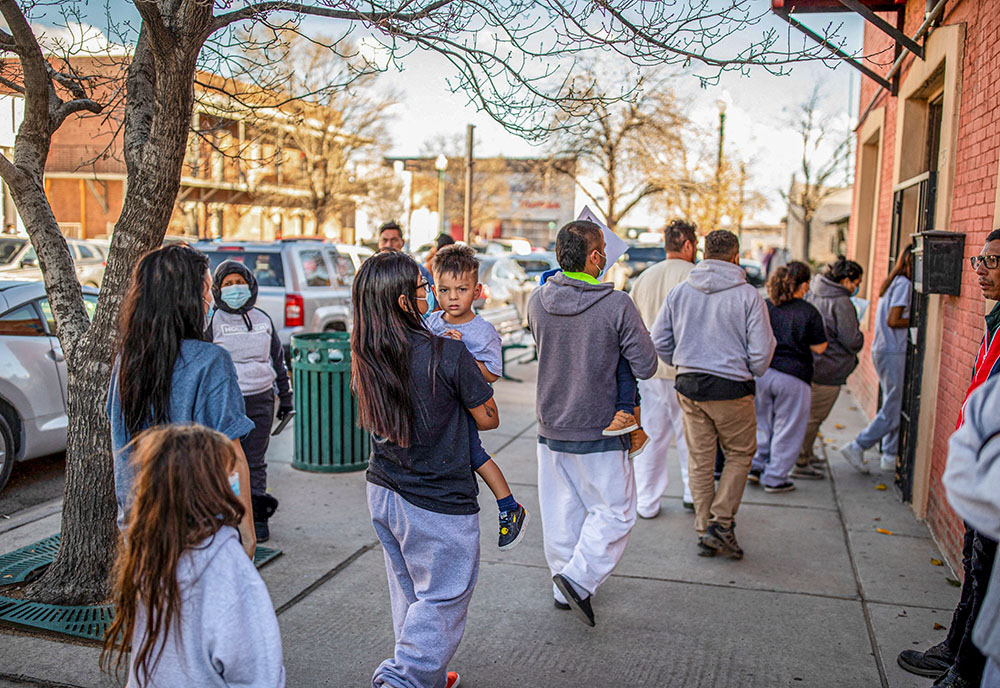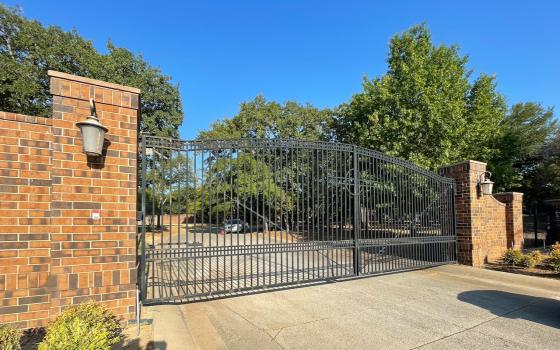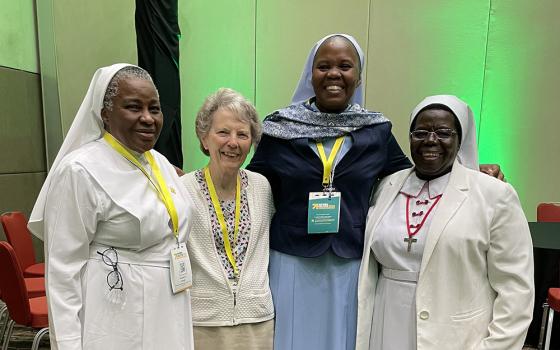
A family of migrants is dropped off by a transport contractor for the U.S. Customs and Border Protection at a shelter run by Annunciation House in downtown El Paso, Texas, Dec. 13, 2022. A state judge blocked the Texas attorney general's demands for the records of Annunciation House March 11, 2024, citing concerns the state had a "predetermined" motive to shut down the Catholic nonprofit serving migrants. (OSV News/Reuters/Ivan Pierre Aguirre)
A few years ago, at a Palm Sunday liturgy, we were encouraged to listen to the Passion narrative and place ourselves within the story. Were we the chief priests? Bystanders? Were we accompanying Jesus? What did we hear or see? How did we respond? I remember seeing myself as part of the crowd watching in horror as the scene unfolded.
Today, I feel much the same way as I watch the news. While praying with this weekend's Gospel, I paused as I read the following lines:
The chief priests and the entire Sanhedrin
kept trying to obtain testimony against Jesus
in order to put him to death, but they found none.
Many gave false witness against him,
but their testimony did not agree.
Some took the stand and testified falsely against him,
alleging, "We heard him say,
'I will destroy this temple made with hands
and within three days I will build another
not made with hands.' "
Even so their testimony did not agree."
Doesn't this passage sound like a summary of a current news story and not a Gospel scene that unfolded millennia ago? Today, I am reminded that we don't hear this account only on Palm Sunday; we witness it each and every day around the world.
Just last month, many of us watched in shock as the Texas Attorney General Ken Paxton went after Annunciation House in an attempt to shut down the organization's faith-filled and wholehearted ministry to migrants in El Paso. He accused Annunciation House of "facilitating illegal entry to the United States" and "human smuggling."
Advertisement
In the United States, we also see this within our political system, especially as we head into the presidential election. We hear one side demonizing people who live in poverty, people of color, LGBTQ+ people, Muslim people, women, etc. Like this excerpt from the Passion narrative, we hear many false accusations about anyone who is deemed "other" or "different."
So often, we are horrified when a tragic event occurs and are unsure of how to respond. The shock and scope of the event or problem feel too large. In the midst of baseless accusations that perpetuate fear, how are we called to respond?
Again in today's reading, the Prophet Isaiah gives us an answer when he says, "God has given me a well-trained tongue that I might know how to speak to the weary a word that will rouse them."
In the midst of shocking accusations or attacks against specific groups, our response to any situation will differ given our location, our connection to the circumstances at hand, and our ability. But, for all of us, part of our response should be the same — we must show that we are called to witness to a different way of being in the world, a different way of being in community with one another, and a different way of being siblings to one another.
El Paso Bishop Mark Seitz's response to the baseless accusations hurled at Annunciation House models this. In part, he wrote:
This is not about politics. I know the guests at Annunciation House, those trapped on the other side of the border, and those who have died trying to cross it. I have encountered them and have experienced their pain, suffering and hope. This is about their lives and our shared human dignity.
Our community's actions in this moment, the decisions that we make, and the response that we offer today, will be judged by whether or not we rise to that standard.
Seitz's beautiful response was centered on humanity and our shared human dignity. He reminded us that we are called, as one community, to witness to our shared humanity. Perhaps more importantly, when we speak from a place of hope and shared vision, we ensure that everyone has a chance to thrive.
Our response to issues surrounding the U.S. election must be the same. We know that, with every fiber of our being and in whatever way we are able, we must speak with conviction that all are welcome. Our political engagement must reflect our belief that every faith tradition, nationality, gender/orientation and language are important threads in the fabric of our country.
We must continue to show up for our country and believe that our democracy will continue by voting, engaging in political education and training, and modeling messaging tactics that build up the common good instead of tear down.
I am sure that, no matter where we live, we can place the Passion narrative in today's world. As we prepare to enter into Holy Week, how are we participating in the Palm Sunday story? Where are we witnessing the narrative unfold before us? And how are we called to respond?








